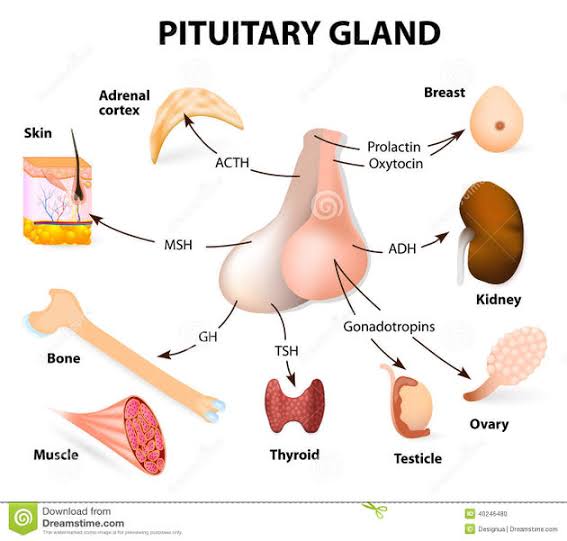- Get link
- X
- Other Apps
JUST IN
- Get link
- X
- Other Apps
Several conditions can affect your pituitary gland. Most are caused by a tumor in or around the pituitary gland. This can impact the release of hormones.
Examples of pituitary gland disorders include:
- Pituitary tumors. Pituitary tumors are usually noncancerous. However, they often interfere with the release of hormones. They can also press against other areas of your brain, leading to vision problems or headaches.
- Hypopituitarism. This condition causes your pituitary gland to produce very little or none of one or more of its hormones. This can affect things like growth or reproductive system function.
- Acromegaly. In this condition, your pituitary gland produces too much growth hormone. This can lead to excessive growth, especially of your hands and feet. It’s often associated with pituitary tumors.
- Diabetes insipidus. This can be caused by a problem with the release of vasopressin. It’s usually due to a head injury, surgery, or a tumor. As a result, people with this condition pass large amounts of heavily diluted urine. They may also feel like they need to drink a lot of water or other fluids.
- Cushing’s disease. The pituitary gland releases too much adrenocorticotropic hormone in people with this condition. This can lead to easy bruising, high blood pressure, weakness, and weight gain. It’s often caused by a tumor near or in the pituitary gland.
- Hyperprolactinemia. In this condition, your blood contains an unusually high amount of prolactin. This can lead to infertility and a decreased sex drive.
- Traumatic brain injury. This involves a sudden blow to your brain. Depending on the injury, it can sometimes damage your pituitary gland and cause problems with memory, communication, or behavior.
EAT A BALANCED, HEALTHY DIET
A balanced diet is good for your health but it can also affect your hormones.
For example, malnourished children may not produce enough growth hormone to meet growth goals for their age group.
General tips for healthy eating include:
- Eating a diet rich in fruits and vegetables, which are great sources of fiber, vitamins, and minerals
- choosing good sources of fats, such as those that contain omega-3 fatty acids and monounsaturated fats.
- opting for whole grains over refined grains.
- reducing sodium intake.
- avoiding refined sugars.
- drinking at least four to six cups of water a day
- Reduce stress.
- Chronic stress can lead to an increase in cortisol release.
Too much cortisol can sometimes lead to:
- insomnia
- weight gain
- anxiety
- depression
- Try setting aside some time to get at least 30 minutes per day of exercise or work on a relaxing hobby.
What foods heal the pituitary gland?
Important nutrients for good pituitary function are a variety of minerals- especially manganese, magnesium, and vitamin E. Foods rich in minerals are wheat, leafy greens, nuts and some legumes. Other important nutrients are iron and iodine.


Comments
Post a Comment
Let know your comments